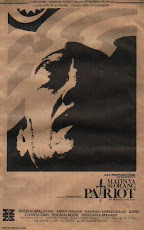#79. Israeli anti-war Oscar bid draws Arabs despite ban
Joseph Nasr – Tue Feb 3, 11:39 am ET
Reuters
A scene from the Israeli film 'Waltz with Bashir' is seen in this undated publicity photo released to Reuters January 22, 2009.(Sony Pictures Classics/Handout/Reuters)
JERUSALEM (Reuters) – You can't see "Waltz with Bashir" legally in Lebanon but you can buy copies of the Oscar-nominated Israeli anti-war film in Beirut's Hamra district where director Ari Folman saw his life change 26 years ago.
"It's one of the greatest films I've ever seen," said Lokman Slim, an activist with Lebanon's UMAM organization which aims to preserve the country's memories of war by screening movies related to its decades of bloodshed.
"I feel jealous that those we should consider our enemies have the courage to revisit events in which they were involved, while we Lebanese are in an endless silence regarding our history," Lokman told Reuters in Beirut.
"Waltz with Bashir" -- the title conveys Israel's alliance with Lebanon's Christian leader at the time, Bashir Gemayel -- mixes documentary and animation to depict the trauma of an Israeli invasion 26 years ago to expel Palestinian guerrillas.
The film ends with the massacre of hundreds of Palestinians by Israel's Lebanese Christian allies in the Sabra and Shatila refugee camps of Beirut.
Against a narrative based on buried recollections of former brothers-in-arms, Folman shows war in the nightmarish colors of a comic book -- until the final moments when it shockingly culminates with actual footage of piles of dead bodies.
Some 600 Palestinian women, children and old people in Sabra and Shatila were slaughtered under the light of flares fired over Beirut by Folman's army unit, ordered to help the Christian Phalangist militia secure the camps.
Folman was a 19-year-old conscript at the time. His movie has won a Golden Globe for best foreign language film of 2008 and was nominated last month for an Oscar for 'best foreign film'
BANNED
In Lebanon, "Waltz" is banned under laws that forbid trade with Israel. But there is huge interest, said Monika Borgmann, who acquired a copy from a German distributor and organized a private screening in Beirut in January.
"I invited 30 people but they brought their friends with them and we ended up being around 90," said Borgmann, who heads UMAM. "When the film finished, people were very, very silent and when they went out, some had tears in their eyes."
Pirated DVD copies now sell for $2 each in Beirut's Hamra district, which features in the film as the site of fierce battles between Folman's army unit and Palestinian guerrillas.
Not everyone is pleased by how Folman tells the story.
"It only presents part of the truth, not the whole truth. It is as if the director is saying, 'We (Israelis) did not commit this crime, the Phalangists did,'" said Ziad Moussa, a retired teacher in the West Bank city of Ramallah where "Waltz with Bashir" was screened at the Franco-German cultural center.
But despite his reservations about Folman's depiction of service in Lebanon as an ordeal that left deep psychological scars, Moussa said the film was a "step in the right direction" to healing the bloody past between Israelis and Palestinians.
Azzam Mansour, 30, a librarian at Ramallah's Franco-German center, said more than 200 Palestinians watched the film.
The Sabra and Shatila massacre prompted a world outcry, and in Israel a commission of inquiry found then-defense minister Ariel Sharon indirectly responsible, forcing him to resign.
It said Sharon, who later went on to become prime minister, ignored warnings that the Phalangists would massacre Palestinian refugees to avenge the killing of hundreds of Christian civilians by Palestinian guerrillas in southern Lebanon six years earlier.
Israeli film researcher Raya Morag said Palestinian criticism that "Waltz with Bashir" was one-sided was natural, given that it represented Folman's point of view.
"Every people has its own view and own narrative. It is a totally legitimate claim," she said of Moussa's remarks. "If it were a Palestinian filmmaker, it would have presented the Palestinian point of view."
Israel launched the operation in June 1982 to fend off attacks against its northern towns by Palestinian guerrillas led by late Palestinian President Yasser Arafat, who had turned war-torn Beirut into a base for attacks on Israel.
Israel hoped to end the war and seal a peace treaty with Gemayel. But the plan was sabotaged by Syria, which had Gemayel assassinated on September 14, 1982.
Lebanon's al-Mustaqbal newspaper in December quoted Information Minister Tareq Mitri as saying that the ban was useless because the film was available on the Internet.
But the Lebanese daily A-Safir, which is sympathetic toward Hezbollah guerrillas with whom Israel fought a war in 2006, said "Waltz" was simply an attempt by Folman to "purge his personal memory" of its ugly recollections of the 1982 offensive.
"It did not contribute to seeking reconciliation and forgiveness or even apologizing from the Palestinians and the Lebanese," the paper said.
(Additional reporting by Tom Perry in Beirut, Editing by xx)







0 ulasan:
Catat Ulasan